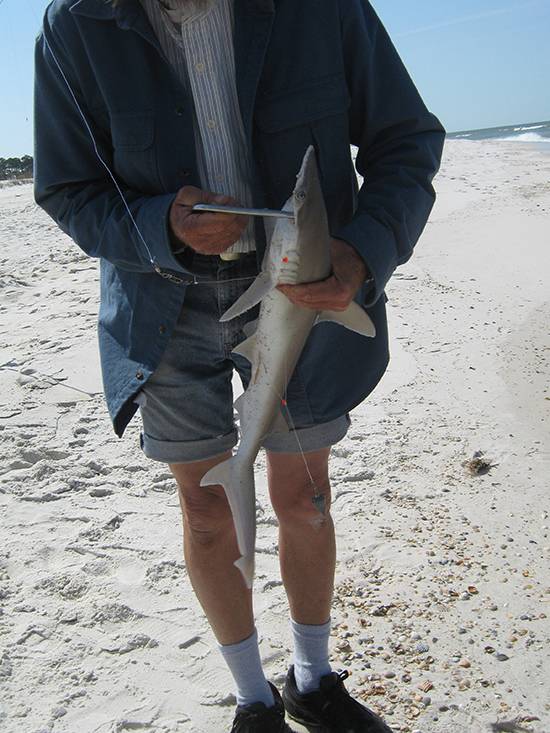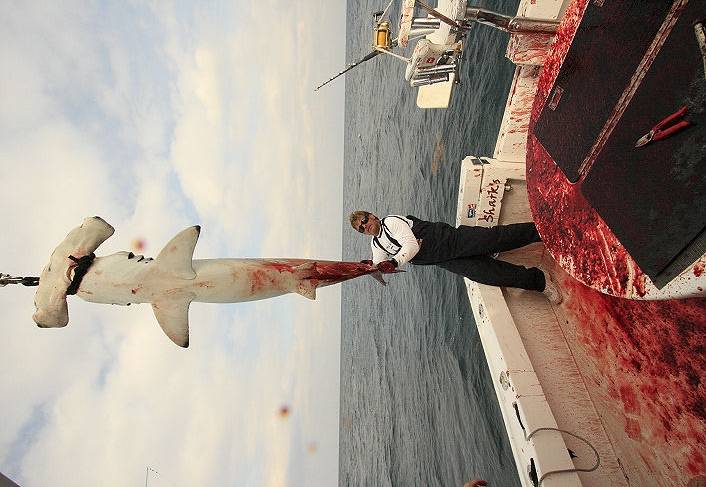It was the last day of spring break, 2010. St. Joseph Peninsula State Park, Florida. Every year we camp next to one of the most beautiful beaches in the world, and the kids and I were hanging out in the sun and surf while my husband Drew finished packing away the tent.
The whole incident took less than 3 minutes. One moment, my kids and I (along with some other families) were admiring a beautiful bonnethead shark caught by an older fisherman, who was planning to release the animal, and the next moment, three college-aged boys talked the fisherman into letting them hold the fish, then they walked it up the beach a few yards, put a knife to its head, and gutted and finned it, throwing the body parts onto the beach in front of us. From the time we witnessed the fisherman struggling to pull the hook from the shark’s mouth to the bloody end, something inside me was screaming “unfair!” and I followed the boys, all the time pleading for them to let the shark go, then yelling at them for lying about their intentions. My hands were shaking, my sense of outrage, exponential.

But why was I reacting like this? I mean, for years we have taken the kids fishing here in the Midwest, often cleaning and eating the very fish we catch. We aren’t vegetarians. And besides, it is completely legal to fish and kill bonnethead sharks in Florida (although there is a strict bag limit of one shark per day per person and there are laws against cleaning fish on the beach). This incident continues to disturb me, though, not only because of the unethical way the boys acquired their “trophy”, but perhaps because of the simple magnificence of the creature itself, and my suspicions that it is exactly because of boys like these that we may be witnessing the very last decade of marine wildlife as we know it.

I think Neil Hammerschlag, a research associate with The Pew Institute for Ocean Science would agree with me. In an article for South Florida Adventures on-line magazine he says, “Shark fishing is only a macho thing. It’s not a sport, especially when the other side doesn’t even know it’s a sport.” According to Hammerschlag, hammerheads have dropped 89 percent in the Atlantic Ocean over the last 50 years and other shark species are down a similar amount. But these figures are widely disputed, especially when it comes to individual species. In 2008, the Office of Sustainable Fisheries, National Marine Fisheries Service assessed bonnethead stock in the Atlantic and determined that bonnethead sharks were not overfished (SSF 2005/SSF MSY= 1.13). On the other hand, just one year earlier, the Sarasota Herald-Tribune reported evidence that shark populations were depleted 50 to 75 percent due to overfishing. Proponents of recreational shark fishing implicate off-shore commercial fishing as the cause for this decline, and underscore the importance of recreational fishing to Florida’s economy. Indeed, many tourists will pay charter boat operators over a thousand dollars a day for the privilege of landing a shark.
But disputed figures aside, what would make a group of boys lie to a senior citizen and then brazenly hack up the poor fish in front of a group that was just moments before admiring the creature? The simple thrill of killing a shark? Perhaps. The other adults simply looked away and ushered their kids from the scene. A friend of the family who was camping near us, when told what had happened, simply shrugged her shoulders and said, “Well, I wasn’t there.” The park ranger that was called to the scene never showed up. Yes, the offense was relatively minor. Yes, shark fishing is somewhat of an institution around those parts. Yes, some boys will always be boys, driven to prove their manhoods by conquering, or in this case, pretending to conquer, apex predators of all shapes and sizes, no matter the means. However, our reaction to the incident, our turning away, has much more serious, and real implications.
One of my all-time favorite Harper’s articles (The Age of Aquariums by Ginger Strand, August, 2005) points out that most of the largest, and most touristed and fiscally successful, marine aquariums in the United States have been built adjacent to bodies of water that have been ruined for all time by human pollution and activity. The article goes on to suggest that such institutions have a psychological function for Americans by allowing us to continue to deny our role in the destruction and degradation of our environment. Like the Aquarium restaurant chain (owned by the people who brought us Rain Forest Café), or Sea World (which has come under even more scrutiny these days in the wake of the Oscar-Award-winning documentary “Cove”), these aquatic “theme parks” serve to reinforce our romantic notions of marine life (cute dolphin shows, rendered-harmless sting-ray petting ponds, sanitized, concrete coral reef-themed eateries, etc.), lulling us into the belief that nothing is amiss and that nature is ours to consume readily and at our leisure. The price for a one-day ticket to Discovery Cove in Orlando, Florida, a theme park that promises visitors an unforgettable day of snorkeling over a manufactured coral reef, unlimited food and drink, and a few minutes swimming with a dolphin, reaches upward over 300 dollars per person in season. And the popularity of such places is skyrocketing with no end in sight.
 So, it is no wonder that people don’t want to know what really goes on, that these boys may soon kill thousands of sharks as charter boat operators, or worse, become executives or lobbyists of large fishing companies that are even now harvesting the last of our ocean’s creatures. What is personal is political. Those boys would do anything for the thrill of butchering a shark, even lie to an old man and make 9 year-olds cry.
So, it is no wonder that people don’t want to know what really goes on, that these boys may soon kill thousands of sharks as charter boat operators, or worse, become executives or lobbyists of large fishing companies that are even now harvesting the last of our ocean’s creatures. What is personal is political. Those boys would do anything for the thrill of butchering a shark, even lie to an old man and make 9 year-olds cry.
Don’t get me wrong. I’m all for the thrill of fishing, or playing with dolphins or even a fun day at a theme park, especially if it gets us pumped up about nature and the importance of conservation. And especially if we treat nature with the respect it deserves. But too often, we walk away from our natural encounters as passive consumers looking for the next “fix”, instead of acknowledging the very immediate dangers to these natural resources, or trying to figure out our role in saving them. We need to teach our children to speak up for wild marine animals. We need to let them know how important it is to keep sharks in our oceans where they play a critical role in the ecosystem.








